Glass fermentation weights are your best defense against mold and spoilage in fermented foods. They'll keep your vegetables fully submerged under the brine while limiting oxygen exposure – two essential factors for successful fermentation. Look for food-grade tempered glass weights that fit snugly in wide-mouth Mason jars, with weights between 5-6.4 ounces for standard ferments. You'll want features like easy-grip handles and stackable designs for versatility. While single-piece weights work well, split designs offer better coverage and flexibility. Understanding the key features and proper usage of glass weights will transform your fermentation results.
Why Glass Weights Matter
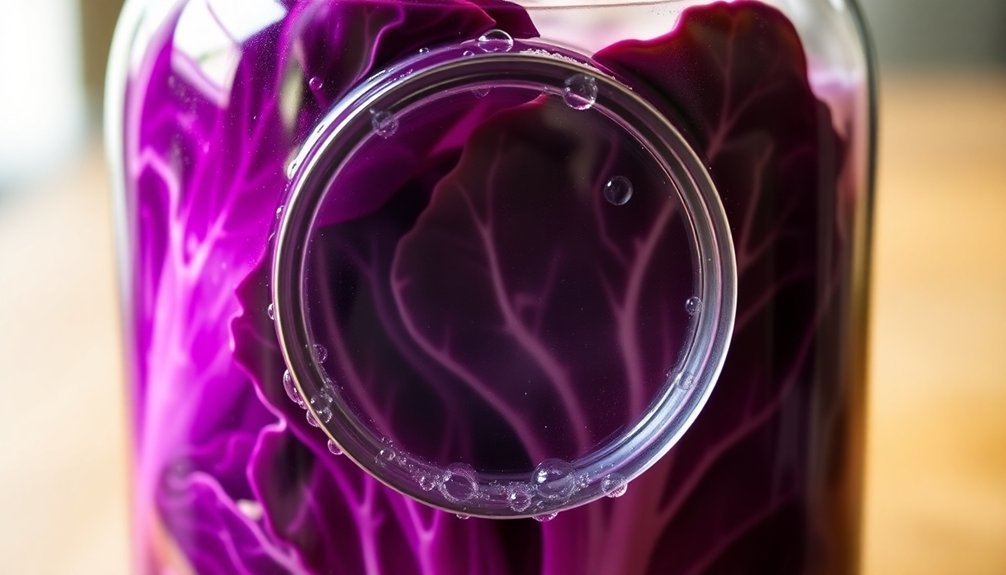
Why are glass weights considered essential tools for fermentation? They're fundamental in creating the ideal environment for your fermented foods by keeping vegetables completely submerged under brine. This submersion prevents unwanted mold growth and guarantees proper fermentation by limiting oxygen exposure. Glass weights serve as a chemical-free option perfect for preserving the purity of your ferments.
Glass weights stand out due to their non-porous, non-toxic nature. Unlike plastic alternatives or makeshift solutions, they won't absorb flavors or odors, and they won't leach harmful substances into your ferments.
You'll appreciate their durability and ability to withstand acidic environments, making them perfect for everything from sauerkraut to kimchi.
When you're fermenting, consistency is key. Glass weights provide steady pressure that keeps vegetables submerged while supporting the growth of beneficial microorganisms. Their transparent nature lets you monitor your fermentation's progress easily, and their easy-to-clean surface helps prevent contamination between batches.
You'll find that glass weights are a superior choice compared to DIY solutions like bags or stones, which can harbor bacteria or leak. They're compatible with airlocks and maintain their effectiveness throughout long fermentation periods, making them a reliable investment for your fermentation projects.
Types of Glass Fermentation Weights
When choosing glass fermentation weights, you'll find two main design options for your mason jars.
Single-Piece Glass Weights
Single-piece glass weights offer simplicity with their one-piece construction that fits snugly inside wide-mouth jars. These weights are often designed with handles for easy placement and removal, such as those from Country Trading Co., which feature a small handle and are heavy enough to keep down the most vigorous ferments. At 200 grams each, these weights provide reliable pressure to keep ingredients submerged.
Stackable Multi-Weight Designs
If you prefer flexibility, stackable multi-weight designs let you adjust the pressure by adding or removing individual pieces to match your fermentation needs. An example of this design is the split fermentation weights, where each weight is split in half, allowing for more coverage inside the jar. These weights fit below the neck of the jar and can be inserted at an angle, providing better coverage and flexibility in managing the fermentation process.
Single-Piece Glass Designs
Throughout the fermentation process, single-piece glass weights serve as essential tools for keeping vegetables and other ferments properly submerged. These weights, typically designed for wide-mouth Mason jars, are made from non-porous, food-safe soda-lime glass and range from 6 to 7 ounces in weight. Popular options like Pickle Pebbles weigh between 5.05-5.60 ounces.
You'll find that high-quality glass weights are tempered to prevent cracking and feature handles for easy removal. They're dishwasher safe, boiling water safe, and free from lead and cadmium, ensuring your ferments remain uncontaminated.
The weights effectively keep ingredients submerged during the critical first week of fermentation and can maintain their effectiveness for up to 3-4 weeks.
When using single-piece glass weights, you'll benefit from their ability to press out air pockets, which reduces mold risk and improves fermentation quality. They work well with various ferment types, from loose vegetables to pastes and liquid-based ferments.
While some DIY alternatives exist, such as nesting smaller jars within larger ones, commercial glass weights offer a more standardized and reliable solution. With proper care, these weights can last a lifetime, making them a worthwhile investment for your fermentation projects.
Stackable Multi-Weight Options
Building upon the concept of single-piece weights, stackable multi-weight options offer enhanced flexibility for fermentation projects. These weights, made from tempered soda-lime glass, range from 6 to 7 ounces and feature diameters between 66mm to 68.5mm to accommodate different jar sizes.
You'll find them especially useful when you need to adjust the pressure on your ferments or manage varying batch sizes. Wide mouth compatibility ensures the weights fit perfectly into Mason jars.
The stackable design's versatility shines through its multiple configuration options, while built-in handles make placement and removal straightforward. You'll appreciate that these weights are dishwasher-safe and crafted from lead-free materials, ensuring both convenience and food safety.
Here are three key benefits you'll gain from stackable weights:
- Customizable pressure control by combining multiple weights
- Better brine displacement to achieve ideal fermentation levels
- Versatility across different jar sizes and ferment types
When selecting stackable weights, focus on those made with high-quality tempered glass for durability and safety. The thickness, typically between 18.5mm to 20mm, provides stability while the stacking feature allows you to adapt to various fermentation needs.
Safety Features to Look For
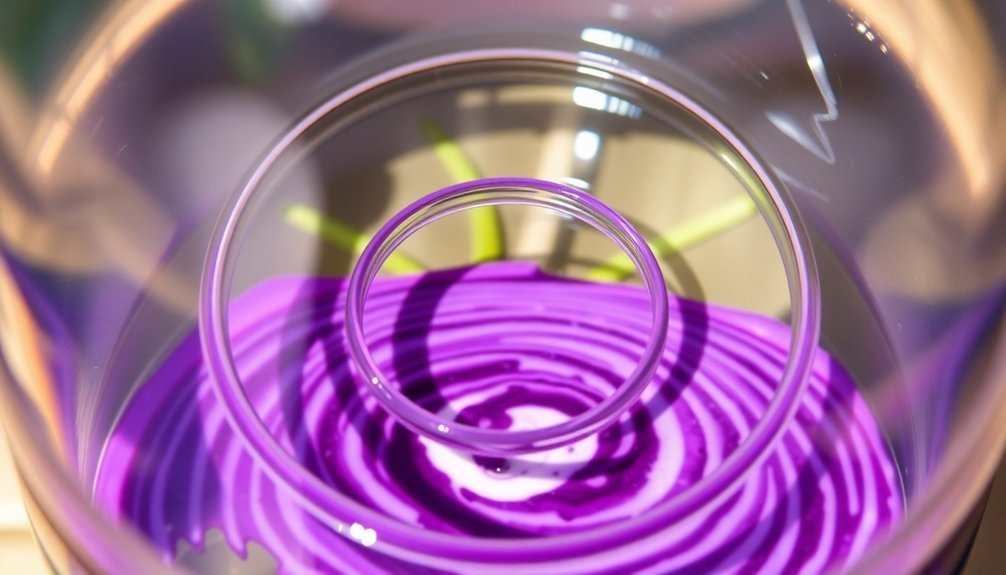
When choosing glass fermentation weights, you'll want to check that they meet FDA food-grade standards and are certified free of harmful chemicals like BPA and lead.
Your weights should withstand temperature changes from cold storage to hot sanitization without cracking or degrading.
Quality glass weights undergo rigorous heat resistance testing to guarantee they won't shatter during temperature fluctuations, a vital safety feature for long-term fermentation projects. The weights should be made from non-iridized soda glass to ensure they remain stable in acidic fermentation environments.
Non-Toxic Material Standards
Safety considerations in fermentation weights begin with choosing materials that won't compromise your food. Glass weights, particularly those made from non-iridized soda glass, offer the safest option as they're lead-free and won't leach chemicals into your ferments. Creating an anaerobic environment is crucial for preventing harmful bacteria growth and ensuring proper fermentation.
Unlike ceramic weights that can harbor bacteria in their porous surface, glass weights remain non-porous, preventing the absorption of flavors and odors from previous batches.
When selecting your fermentation weights, make certain they meet these essential standards:
- Material certification: Verify that weights have been tested for lead and cadmium content, meeting food-grade safety requirements.
- Weight specifications: Choose weights that are at least 7 ounces (200g) to effectively keep ferments submerged.
- Design integrity: Look for high-quality glass that resists chipping and cracking, with easy-grip features for removal.
You'll want to prioritize weights specifically designed for mason jars, guaranteeing a snug fit that maximizes brine coverage. While glass weights can break under extreme conditions, their durability and non-reactive properties make them ideal for regular use.
Remember to check if your weights are dishwasher safe for convenient cleaning and maintenance.
Heat Resistance Testing
Heat resistance testing stands out as one of the most critical factors in selecting fermentation weights. When you're choosing glass weights for your fermentation projects, you'll want to guarantee they can handle temperature fluctuations without compromising their structural integrity or safety features.
Look for weights that have undergone thorough thermographic analysis and temperature cycling tests. These assessments verify the glass's ability to maintain uniform heat distribution and withstand repeated temperature changes without developing weak points. Modern stoneware weights, like those from Stone Creek Trading, offer superior temperature stability.
You'll also want to confirm that the weights are made from non-iridized soda glass or similar materials proven to handle typical fermentation temperatures (up to 40°C/104°F).
Pay special attention to weights that feature high-temperature firing during manufacturing, as this process enhances their thermal stability. The glass should be non-porous and completely lead-free to guarantee food safety.
When examining potential weights, check for certification from relevant food safety authorities and ask about specific heat resistance testing methods used. Don't forget to inspect the surface for any signs of irregularities that might affect heat distribution or compromise the weight's durability during temperature changes.
Proper Weight Selection and Sizing
For successful fermentation, selecting the right glass weight is essential to keeping your vegetables properly submerged. You'll want to choose weights made from non-reactive materials like tempered glass or ceramic, as they won't leach anything into your ferments and are easy to clean.
Look for non-iridized soda glass without air bubbles or imperfections to prevent cracking. Pickle Pebbles and Easy Weights are popular commercial options that work well for most fermentation projects.
When selecting your weights, consider both the size of your fermenting jar and the weight needed to keep ingredients submerged. Wide-mouth Mason jars typically offer easier packing and require appropriately sized weights that fit snugly without sticking out too much.
Here's what to look for in an effective glass weight:
- Weight range between 5.05-6.4 ounces (142-182 grams) for standard ferments, though heavier options up to 2.9 pounds are available for challenging ferments
- Smooth surfaces that are easy to clean and reduce contamination risk
- Handles or grip-friendly designs for easy insertion and removal
For very active ferments or partially filled jars, you might need multiple weights. Consider using additional weights or small dishes if your primary weight isn't heavy enough to keep vegetables submerged for 3-4 weeks.
Cleaning and Maintenance Tips
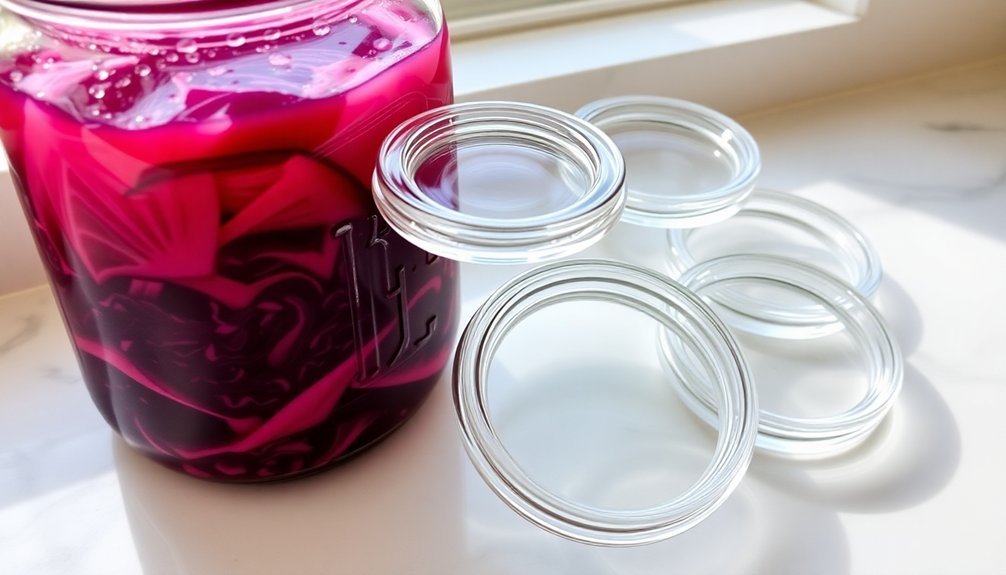
While maintaining glass fermentation weights might seem straightforward, proper cleaning and care guarantee their longevity and safe fermentation. You'll want to wash your weights thoroughly with dish soap and a brush, making sure to scrub all surfaces and rinse away any residue. While they're dishwasher safe, hand washing offers better control over the cleaning process.
If you're dealing with stuck weights, don't force them out. Instead, try using hot water to expand the glass or add dish soap as a lubricant. For stubborn cases, soak the jar and weight in hot water, and consider switching to weights with holes for easier removal.
| Maintenance Task | Frequency | Important Notes |
|---|---|---|
| Basic Cleaning | After each use | Use dish soap, avoid abrasives |
| Deep Cleaning | Monthly | Sanitize and inspect for damage |
| Storage Prep | Before storing | Dry completely, store in clean place |
Glass weights have a significant advantage over ceramic ones since they're non-porous and don't absorb bacteria or odors. While ceramic weights often need boiling and vinegar soaks, glass weights require simpler maintenance. Remember to inspect your weights regularly for damage and store them in a clean, dry place to prevent contamination.
Common Glass Weight Mistakes
Experience shows that even seasoned fermenters make several common mistakes when using glass weights. You'll find that choosing the wrong size or weight can substantially impact your fermentation success, as incompatible sizes and insufficient weight often lead to floating vegetables and potential spoilage.
Watch out for these critical errors when using glass weights:
- Selecting weights that don't match your jar size – remember that standard weights only come in two sizes and may leave too much headspace or stick out partially uncovered.
- Using insufficient weight combinations – don't assume a single glass weight will keep everything submerged; you might need to layer weights for proper submersion.
- Improper handling during removal – avoid contaminating your ferment by reaching in with unwashed hands or using utensils that might scratch your weights.
You'll also want to think about the material quality of your weights. While glass is non-porous and easy to clean, low-quality glass weights can crack during fermentation.
If you're finding your glass weights problematic, consider alternatives like ceramic dishes or cabbage leaves, which can be equally effective when used correctly.
Best Practices for Extended Use
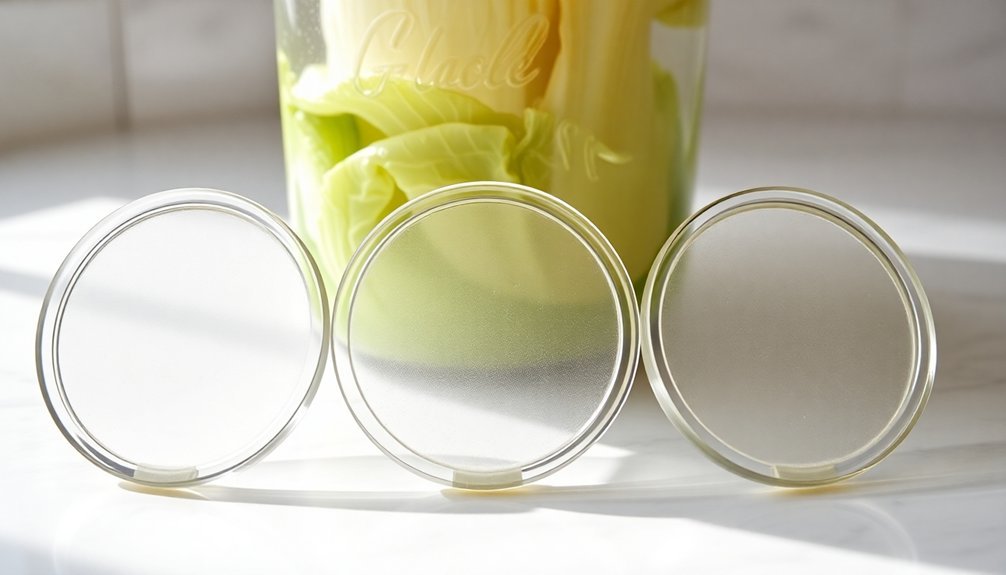
Maintaining glass weights properly over time can substantially extend their lifespan and effectiveness in your fermentation projects. After each use, thoroughly sanitize your glass weights with hot water and make certain they're completely dry before storage to prevent bacterial buildup.
You'll want to inspect them regularly for chips or cracks that could harbor harmful bacteria.
When using glass weights for long-term fermentation, always handle them with clean hands and sterile utensils. Keep track of your brine levels daily, adjusting as needed to maintain proper coverage.
As you use your ferments, transfer them to smaller containers to minimize air exposure, making sure your glass weights still fit appropriately in the new vessels.
For ideal preservation, pair your glass weights with proper cold storage techniques. Once fermentation is complete, store your vessels in the refrigerator to slow down the process.
Remember that while good bacteria protect your ferment during active fermentation, maintaining sterility becomes vital afterward. Don't introduce any new elements into your ferment after the initial process, as this can compromise the entire batch.
Consider keeping multiple sizes of glass weights to accommodate different jar sizes as you transfer contents.
Alternative Weight Solutions Compared
Beyond traditional glass weights, several alternative solutions offer unique advantages for keeping ferments submerged. You'll find that nested jars provide excellent pressure while being cost-effective, and ceramic stones offer substantial weight though they require careful cleaning.
Natural options like cabbage leaves or zucchini strips can serve as effective barriers, especially when combined with other weighting methods.
For successful fermentation with alternative weights, consider these proven solutions:
- Use a smaller Mason jar filled with water as a weight inside your fermentation vessel – it's adjustable, clean, and provides consistent pressure.
- Combine a ceramic dish with additional weights for custom pressure levels, making certain you don't exceed the vessel's capacity.
- Layer large cabbage leaves over your ferment before adding weights to create a natural barrier that helps distribute pressure evenly.
When selecting alternative weights, you'll want to make certain they're food-safe, easy to clean, and compatible with your fermentation vessel's size. Remember that different ferments may require varying levels of pressure, so it's helpful to have multiple weighting options available in your kitchen.
Storage and Handling Guidelines
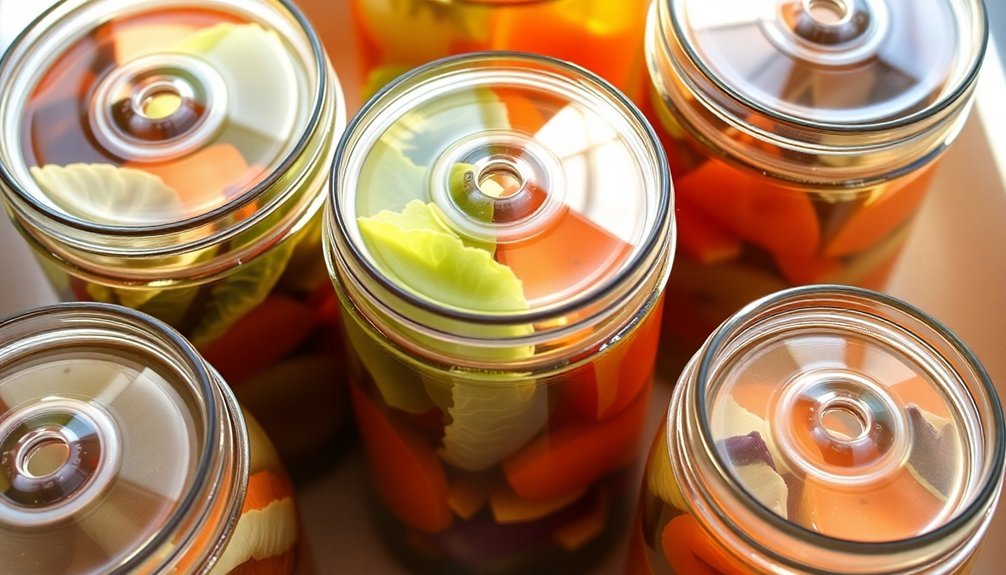
Safeguarding your fermented foods begins with proper storage and handling techniques. You'll want to keep your ferments in cold storage between 32 to 50 degrees Fahrenheit, with a refrigerator or cold cellar being ideal locations.
If you don't have these options, a garage or basement can work well, maintaining temperatures between 60 to 65°F.
When handling your ferments, always use clean hands and tools to prevent contamination. Remove any surface scum with a clean, non-metal spoon, and avoid unnecessary disturbance of the fermenting vegetables to minimize oxygen exposure.
You'll need to store your ferments in sealed containers away from direct sunlight and heat sources.
For long-term storage, you can keep fermented vegetables for up to a year in cold storage, while fermented fruits should be consumed within a month.
If you want to pause fermentation completely, freezing is an effective option. Don't can your fermented foods, as this will destroy the beneficial probiotics.
Remember to regularly check your stored ferments for any signs of spoilage, such as mold or unusual odors, and always store them in dark, cool environments for best preservation.
Frequently Asked Questions
Can Glass Weights Prevent Kahm Yeast From Forming on Ferments?
Yes, glass weights can help prevent kahm yeast by keeping your ferments fully submerged under the brine. When you're using weights properly, you'll create an oxygen-free environment that discourages kahm yeast growth.
What's the Maximum Temperature Difference Glass Weights Can Safely Handle?
While specific maximum temperature differences aren't documented, you'll want to avoid sudden temperature changes with glass weights. Gradually shift between temperatures to prevent thermal shock, though they're typically safe from freezer to oven use.
Do Glass Weights Affect Fermentation Time Compared to Other Weight Methods?
No, your choice of glass weights won't affect fermentation time compared to other weight methods. As long as you're keeping vegetables properly submerged, the weight type doesn't impact how quickly fermentation occurs.
Can Glass Weights Be Used With Square or Rectangular Fermentation Containers?
You can use glass weights in square containers, but they won't fit perfectly. You'll need to think about using multiple weights or combining them with other methods like plates or brine-filled bags for better coverage.
How Many Glass Weights Should Be Stacked for Dense Vegetables?
You'll typically need 1-2 glass weights for dense vegetables. Don't stack more than two weights, as excessive pressure can damage your ferment. One heavier weight is often better than multiple lighter ones.
In Summary
You'll get the most out of your glass fermentation weights by choosing the right size, maintaining proper cleaning routines, and handling them with care. Remember to keep your weights submerged at all times and inspect them regularly for chips or cracks. When used correctly, these simple tools will help guarantee your ferments stay safely below the brine, resulting in consistently successful fermentation projects.

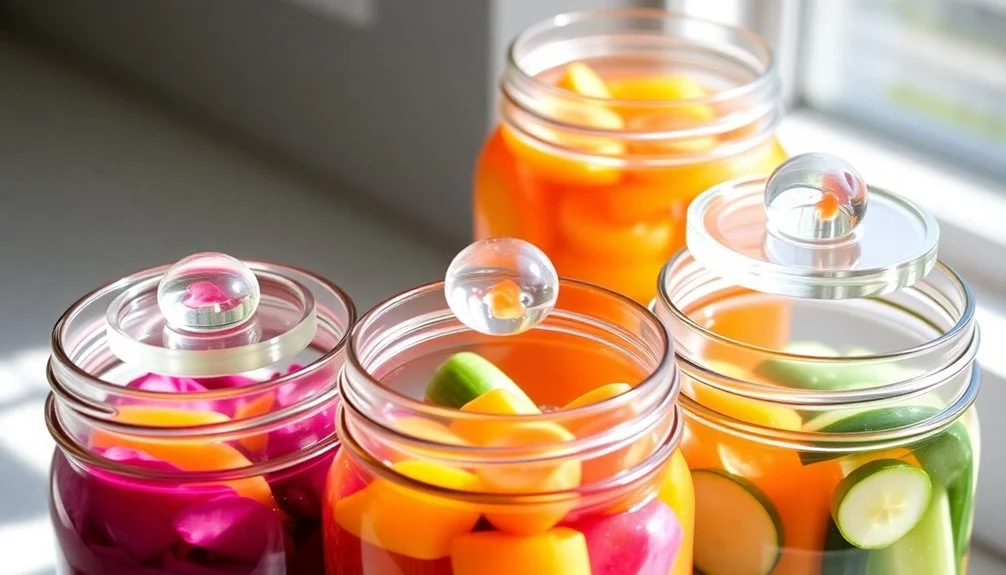
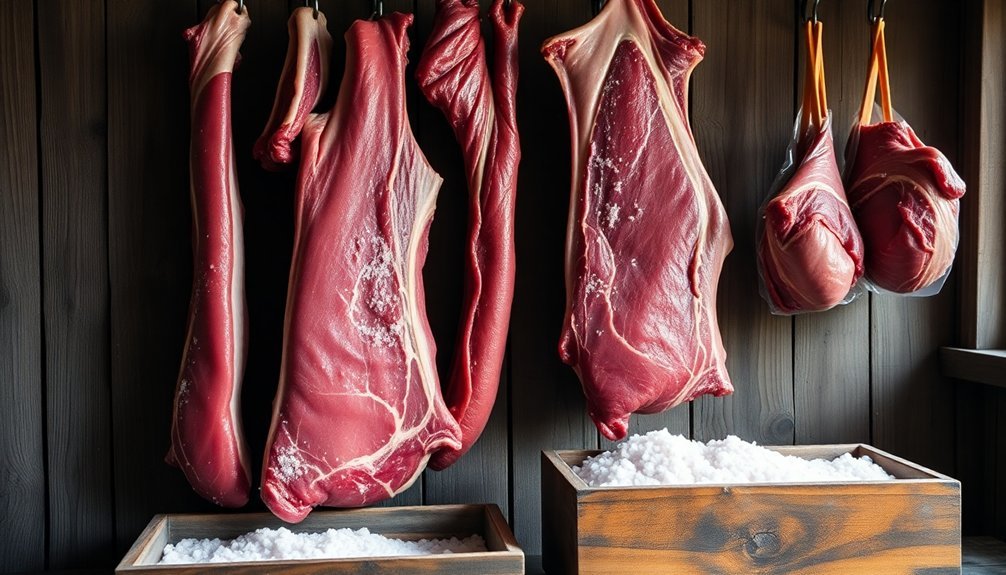
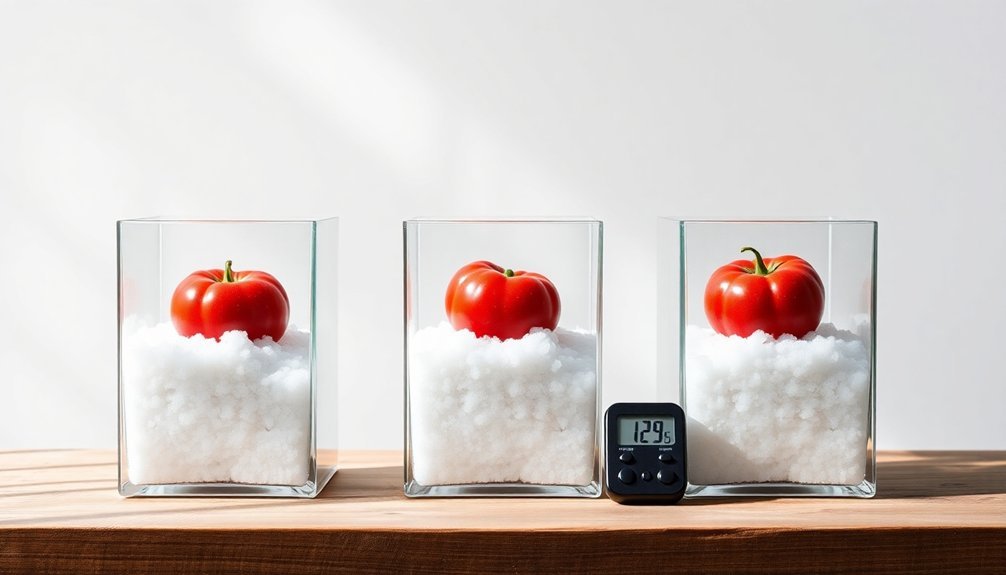
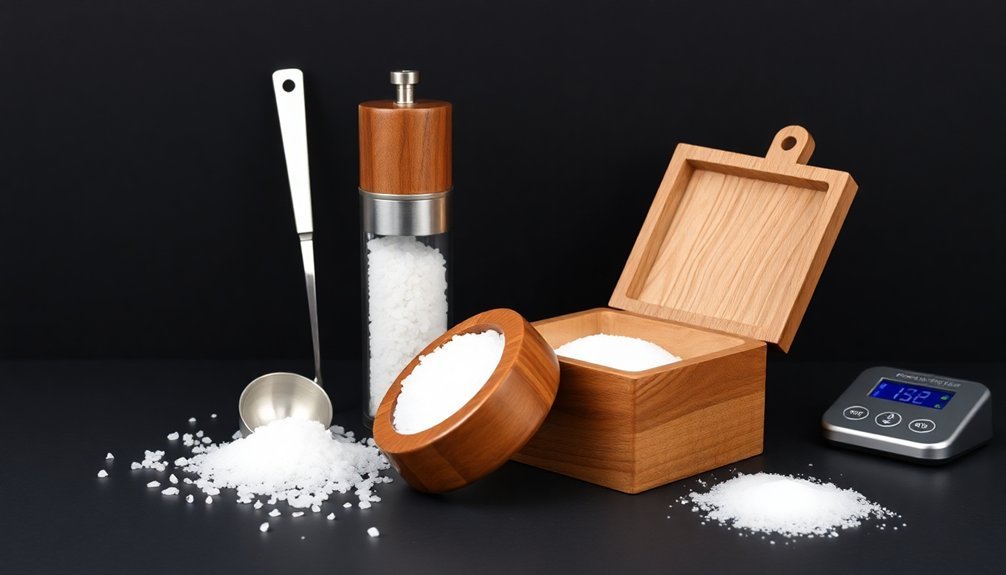
Leave a Reply